人教版五年级下册英语知识点(非常有用)
人教版小学五年级英语下册知识点汇总(完整版)

Unit1 My day 知识点总结一、语音cl — [cl] : clean classpl — [pl] : eggplant茄子 please play注意:cl 和 pl 放在词尾与 e 结合变为cle 和 ple 时发音不同.如people,apple。
二、词汇1、日常活动词汇do morning exercises(做早操)eat breakfast/lunch/dinner(吃早餐/午餐/晚餐)have...class(上…课)take a dancing class(上舞蹈课)play sports(做运动)go for a walk (散步)clean my room(打扫我的房间)go shopping(购物)2、其他词汇exercise 活动;运动 take学习;上(课)dancing跳舞;舞蹈when什么时候;何时 after在(时间)后 start开始(反义对应词finish完成)usually 通常地;惯常地 Spain 西班牙 late 晚;迟(反义对应词early早)why 为什么 a.m.午前;上午 p.m.午后;下午 shop去买东西;购物work 工作 last上一个的;刚过去的 sound听起来好像also 还;也busy 忙的need 需要play 戏剧剧本 letter 信Live 居住island 岛always 总是;一直 cave 山洞;洞穴go swimming 去游泳win 获胜。
三、句型以及语法知识点1、询问别人什么时候做某事某种活动的when特殊疑问句型,使用时间短语回答。
When do you do morning exercises? 你何时做早操?I do morning exercises at 7:00.我七点钟做早操。
When do you finish class in the morning? 你们上午的课到什么时候结束?We finish class at 1 o’clock.我们一点钟结束上午的课。
最新人教版五年级下册英语知识点(非常有用)
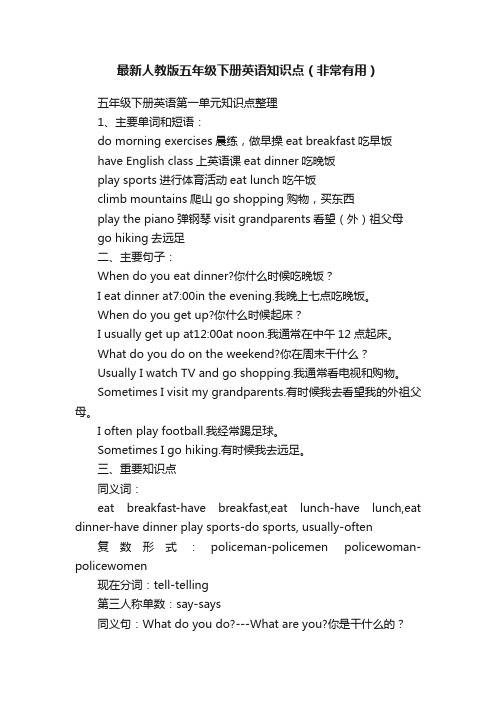
最新人教版五年级下册英语知识点(非常有用)五年级下册英语第一单元知识点整理1、主要单词和短语:do morning exercises晨练,做早操eat breakfast吃早饭have English class上英语课eat dinner吃晚饭play sports进行体育活动eat lunch吃午饭climb mountains爬山go shopping购物,买东西play the piano弹钢琴visit grandparents看望(外)祖父母go hiking去远足二、主要句子:When do you eat dinner?你什么时候吃晚饭?I eat dinner at7:00in the evening.我晚上七点吃晚饭。
When do you get up?你什么时候起床?I usually get up at12:00at noon.我通常在中午12点起床。
What do you do on the weekend?你在周末干什么?Usually I watch TV and go shopping.我通常看电视和购物。
Sometimes I visit my grandparents.有时候我去看望我的外祖父母。
I often play football.我经常踢足球。
Sometimes I go hiking.有时候我去远足。
三、重要知识点同义词:eat breakfast-have breakfast,eat lunch-have lunch,eat dinner-have dinner play sports-do sports, usually-often 复数形式:policeman-policemen policewoman-policewomen现在分词:tell-telling第三人称单数:say-says同义句:What do you do?---What are you?你是干什么的?表示频度的副词:always总是,一直;usually通常,常常;often经常;sometimes有时候以复数形式出现的词组:visit grandparents,plant trees介词后跟表示时间的词语时,表示在某年、某月、某个季节,某个时候(在上午,在下午,在晚上)用in;表示在某一天,在星期几用on,在具体的几点几分用at.too和either的用法区别:too和either都是“也”的意思,但too用于肯定句,either用于否定句。
人教版小学五年级下册英语知识点整理
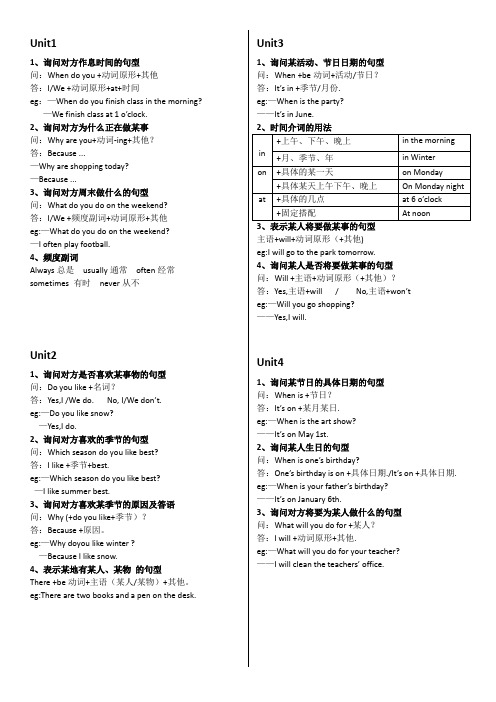
Unit11、询问对方作息时间的句型问:When do you +动词原形+其他答:I/We +动词原形+at+时间eg:—When do you finish class in the morning?—We finish class at 1 o’clock.2、询问对方为什么正在做某事问:Why are you+动词-ing+其他?答:Because ...—Why are shopping today?—Because ...3、询问对方周末做什么的句型问:What do you do on the weekend?答:I/We +频度副词+动词原形+其他eg:—What do you do on the weekend?—I often play football.4、频度副词Always总是usually通常often经常sometimes 有时never从不Unit21、询问对方是否喜欢某事物的句型问:Do you like +名词?答:Yes,I /We do. No, I/We don’t. eg:—Do you like snow?—Yes,I do.2、询问对方喜欢的季节的句型问:Which season do you like best?答:I like +季节+best.eg:—Which season do you like best?—I like summer best.3、询问对方喜欢某季节的原因及答语问:Why (+do you like+季节)?答:Because +原因。
eg:—Why doyou like winter ?—Because I like snow.4、表示某地有某人、某物的句型There +be动词+主语(某人/某物)+其他。
eg:There are two books and a pen on the desk.Unit31、询问某活动、节日日期的句型问:When +be动词+活动/节日?答:It’s in +季节/月份.eg:—When is the party?——It’s in June.主语+will+动词原形(+其他)eg:I will go to the park tomorrow.4、询问某人是否将要做某事的句型问:Will +主语+动词原形(+其他)?答:Yes,主语+will / No,主语+won’t eg:—Will you go shopping?——Yes,I will.Unit41、询问某节日的具体日期的句型问:When is +节日?答:It’s on +某月某日.eg:—When is the art show?——It’s on May 1st.2、询问某人生日的句型问:When is one’s birthday?答:One’s birthday is on +具体日期./It’s on +具体日期. eg:—When is your father’s birthday?——It’s on January 6th.3、询问对方将要为某人做什么的句型问:What will you do for +某人?答:I will +动词原形+其他.eg:—What will you do for your teacher?——I will clean the teachers’ office.1、描述物品归属的句型物品+ be动词(is/are)+(mine/his/hers/yours/ours/theirs) eg:The book is yours.2、确认物品归属地句型问:be动词+this/that/these/those(+其他)+某人的?答:Yes,it is. Yes,they are./ No,it,is’t. No,they aren’t. eg:—Is that crayou his?——Yes,it is.3、询问物品归属的句型问:单数Whose+is it/this/that?复数Whose+are they/these/those?答:It’s/They’re+名词性物主代词/ 名词所有格eg:—Whose bag is this?——It’s mine.4、现在进行时的一般疑问句问:Be动词+主语+动词-ing(+其他)?答:Yes,主语+be动词/ No,主语+be动词+not. eg:—Is she listening to music?——Yes,she is.5、描述某人正在做某事主语+be动词(am/is/are)+动词-ing(+其他).eg:I’m doing my homework now.6、询问某人能否做某事问:Can+主语+动词原形+其他?答:Yes,主语+can. /No,主语+can’t.eg:—Can I play football?——Yes,you can.Unit61、询问多个人或动物正在做什么的句型问:What are +主语(复数)+doing?答:主语(复数)+are+动词-ing+其他.eg:—What are the boys doing?——They are jumping2、询问单个人或动物正在做什么的句型问:What is +主语(单数)+doing?答:主语(单数)+is+动词-ing+其他.eg:—What is Tom doing?——He is playing football.。
人教版五年级下英语知识点汇总
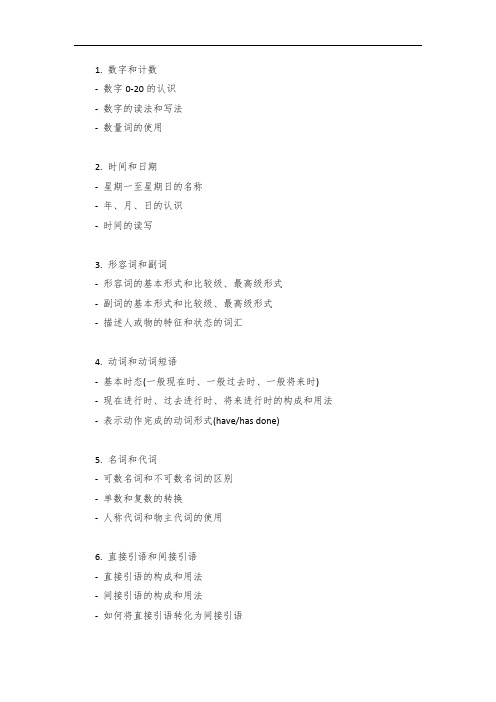
1. 数字和计数
- 数字0-20的认识
- 数字的读法和写法
- 数量词的使用
2. 时间和日期
- 星期一至星期日的名称
- 年、月、日的认识
- 时间的读写
3. 形容词和副词
- 形容词的基本形式和比较级、最高级形式
- 副词的基本形式和比较级、最高级形式
- 描述人或物的特征和状态的词汇
4. 动词和动词短语
- 基本时态(一般现在时、一般过去时、一般将来时) - 现在进行时、过去进行时、将来进行时的构成和用法- 表示动作完成的动词形式(have/has done)
5. 名词和代词
- 可数名词和不可数名词的区别
- 单数和复数的转换
- 人称代词和物主代词的使用
6. 直接引语和间接引语
- 直接引语的构成和用法
- 间接引语的构成和用法
- 如何将直接引语转化为间接引语
7. 连词和从句
- 连词(and, but, or, so, yet等)的用法- 从属连词(when, if, because等)的用法- 如何使用从句来表达复杂的意思。
人教版小学五年级英语下册重点知识总览
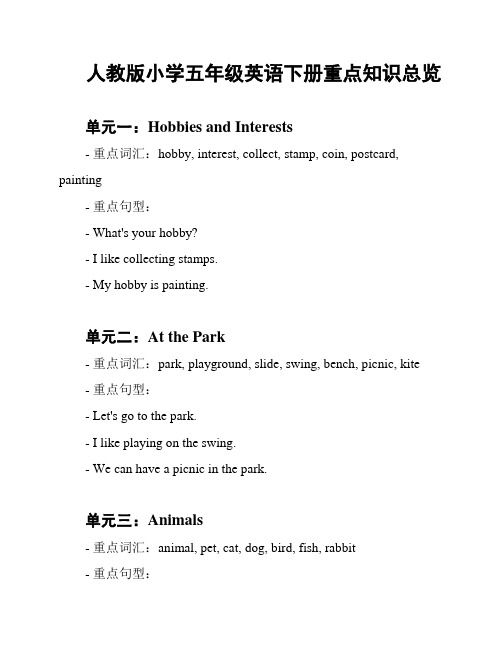
人教版小学五年级英语下册重点知识总览单元一:Hobbies and Interests- 重点词汇:hobby, interest, collect, stamp, coin, postcard, painting- 重点句型:- What's your hobby?- I like collecting stamps.- My hobby is painting.单元二:At the Park- 重点词汇:park, playground, slide, swing, bench, picnic, kite- 重点句型:- Let's go to the park.- I like playing on the swing.- We can have a picnic in the park.单元三:Animals- 重点词汇:animal, pet, cat, dog, bird, fish, rabbit- 重点句型:- Do you have any pets?- I have a pet cat.- The bird is singing.单元四:Food and Drinks- 重点词汇:food, drink, apple, banana, orange, milk, water- 重点句型:- What's your favorite food?- I like eating apples.- Can I have some water?单元五:Weather and Seasons- 重点词汇:weather, sunny, cloudy, rainy, snowy, spring, summer, autumn, winter- 重点句型:- What's the weather like today?- It's sunny and warm.- I like playing in the snow.单元六:My Family- 重点词汇:family, father, mother, brother, sister, grandfather, grandmother- 重点句型:- How many people are there in your family?- I have one brother and one sister.- My grandparents live with us.单元七:School Life- 重点词汇:school, classroom, teacher, student, desk, chair, book, pen- 重点句型:- What's your favorite subject?- I like English.- We study at school.单元八:Sports and Activities- 重点词汇:sports, activity, football, basketball, volleyball, swimming, dancing- 重点句型:- Do you like sports?- Yes, I like playing football.- Let's go swimming together.单元九:Transportation- 重点词汇:transportation, car, bus, bicycle, taxi, train, subway - 重点句型:- How do you go to school?- I go to school by bus.- I want to take a train.单元十:Occupations- 重点词汇:occupation, doctor, teacher, nurse, firefighter, policeman, musician- 重点句型:- What do you want to be in the future?- I want to be a doctor.- My mom is a teacher.以上是人教版小学五年级英语下册的重点知识总览,希望对你有帮助!。
完整版)人教版五年级下册英语知识点整理
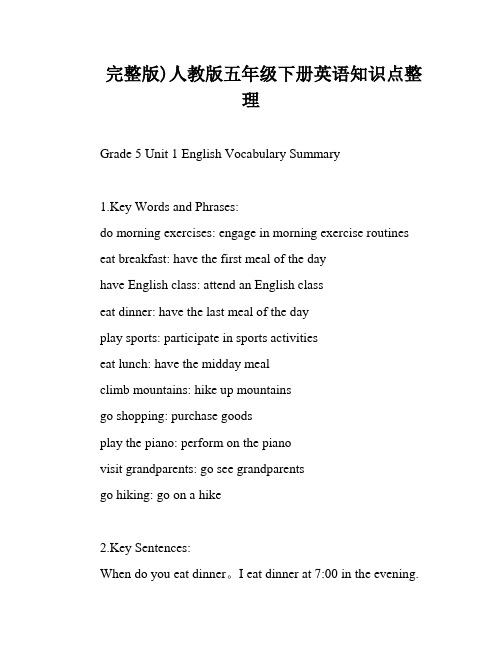
完整版)人教版五年级下册英语知识点整理Grade 5 Unit 1 English Vocabulary Summary1.Key Words and Phrases:do morning exercises: engage in morning exercise routines eat breakfast: have the first meal of the dayhave English class: attend an English classeat dinner: have the last meal of the dayplay sports: participate in sports activitieseat lunch: have the midday mealclimb mountains: hike up mountainsgo shopping: purchase goodsplay the piano: perform on the pianovisit grandparents: go see grandparentsgo hiking: go on a hike2.Key Sentences:When do you eat dinner。
I eat dinner at 7:00 in the evening.When do you get up。
I usually get up at 12:00 at noon.What do you do on the weekend。
Usually。
I watch TV and go shopping。
Sometimes。
I go hiking.I often play football.3.Important Points:Synonyms: eat breakfast - have breakfast。
eat lunch - have lunch。
人教版小学五年级英语下册知识点归纳

人教版小学五年级英语下册知识点归纳五年级英语下册是小学阶段的最后一学期,学生们将进一步学习英语的语法、词汇和日常交际用语。
本文将对五年级英语下册的知识点进行归纳,以帮助学生更好地复习和掌握这些知识。
一、语法知识点1. 一般现在时:表示经常性的动作或习惯性的行为,结构为主语+动词原形。
例如:"She often goes to the park on weekends."2. 一般过去时:表示过去发生的动作或状态,结构为主语+动词过去式。
例如:"Yesterday, I played soccer with my friends."3. 现在进行时:表示现阶段正在进行的动作,结构为主语+be动词(am/is/are)+动词-ing形式。
例如:"They are watching a movie in the cinema."4. 一般将来时:表示将来要发生的动作或事件,结构为主语+will+动词原形。
例如:"I will visit my grandparents next week."5. 动词的-ing形式:表示正在进行的动作,或者作为主语、定语、表语、宾语补足语等。
例如:"I enjoy swimming in the summer."6. 动词的过去式:表示过去发生的动作或状态。
例如:"He ate an apple for breakfast."二、词汇知识点1. 数字:学习1-100的基本数字,以及基本的数学运算符号。
例如:"5 + 3 = 8."2. 季节和月份:学习四季和每个月份的英文表达,以及与之相关的天气和活动。
例如:"In winter, it often snows. We can go skiing."3. 食物:学习常见食物的英文表达,以及与之相关的问答句型。
【口袋书】人教版PEP五年级下册英语 基础知识汇总

人教版PEP五年级下册基础知识汇总Unit 1 My day.重点单词:[四会]dancing 跳舞;舞蹈exercise 活动;运动take 学习;上(课)[三会]after 在(时间)后start 开始usually 通常地;惯常地Spain 西班牙late 晚;迟a.m.午前;上午p.m.午后;下午why 为什么shop 去买东西;购物work 工作last 上一个的;刚过去的sound 听起来好像also 还;也busy 忙的need 需要play 戏剧;剧本letter 信live 居住island 岛always 总是;一直cave 山洞;洞穴win 获胜重点短语:eat breakfast 吃早饭have … class 上…课play sports 进行体育运动do morning exercises 做早操eat dinner 吃晚饭clean my room 打扫我的房间go for a walk 散步go shopping 去买东西;购物take a dancing class 上舞蹈课go swimming 去游泳start class 开始上课last night 昨天晚上after lunch 午饭以后a lot of fun 许多乐趣live on an island 住在一座岛上be good at sports 擅长体育运动字母组合cl 发/kl/ 音:clean 打扫clock 钟class 课;班级clever 聪明的clock 钟字母组合pl 发/pl/ 音:plate 盘子;碟子eggplant 茄子please 请play 玩耍;戏剧重点句型:1.询问别人什么时候做某事的问句及回答:-- When do/does + 主语+ 动词(短语)原形(+ 其他)?-- 主语(+ 频度副词)+ 动词(短语)原形/ 第三人稀单数形式+ at + 具体时间/ At + 具体时间.-- When do you get up? 你什么时候起床?-- I get up at 5 o'clock. 我5点起床。
- 1、下载文档前请自行甄别文档内容的完整性,平台不提供额外的编辑、内容补充、找答案等附加服务。
- 2、"仅部分预览"的文档,不可在线预览部分如存在完整性等问题,可反馈申请退款(可完整预览的文档不适用该条件!)。
- 3、如文档侵犯您的权益,请联系客服反馈,我们会尽快为您处理(人工客服工作时间:9:00-18:30)。
五年级下册英语第一单元知识点整理1、主要单词和短语:do morning exercises晨练,做早操eat breakfast吃早饭have English class上英语课eat dinner吃晚饭play sports进行体育活动eat lunch吃午饭climb mountains爬山go shopping购物,买东西play the piano弹钢琴visit grandparents看望(外)祖父母go hiking去远足二、主要句子:When do you eat dinner?你什么时候吃晚饭?I eat dinner at7:00in the evening.我晚上七点吃晚饭。
When do you get up?你什么时候起床?I usually get up at12:00at noon.我通常在中午12点起床。
What do you do on the weekend?你在周末干什么?Usually I watch TV and go shopping.我通常看电视和购物。
Sometimes I visit my grandparents.有时候我去看望我的外祖父母。
I often play football.我经常踢足球。
Sometimes I go hiking.有时候我去远足。
三、重要知识点同义词:eat breakfast-have breakfast,eat lunch-have lunch,eat dinner-have dinner play sports-do sports, usually-often复数形式:policeman-policemen policewoman-policewomen现在分词:tell-telling第三人称单数:say-says同义句:What do you do?---What are you?你是干什么的?表示频度的副词:always总是,一直;usually通常,常常;often经常;sometimes有时候以复数形式出现的词组:visit grandparents,plant trees介词后跟表示时间的词语时,表示在某年、某月、某个季节,某个时候(在上午,在下午,在晚上)用in;表示在某一天,在星期几用on,在具体的几点几分用at.too和either的用法区别:too和either都是“也”的意思,但too用于肯定句,either用于否定句。
五年级下册英语第二单元知识点整理一、主要单词和短语:season季节spring春天summer夏天fall秋天winter冬天swim游泳fly kites放风筝skate滑冰make a snowman堆雪人plant trees种树二、主要句子:Which season do you like best?你最喜欢哪个季节?I like winter best.我最喜欢冬天。
Summer is good,but fall is my favourite season.夏天是很好,但是秋天是我最喜爱的季节。
Why do you like summer?你为什么喜欢夏天?Because I can swim in the lake.因为我可以在湖里游泳。
Why do you like winter?你为什么喜欢冬天?Because I can sleep a long time.因为我可以睡很长时间的觉。
三、知识点同义词:autumn-fall(秋天)三单:say-says ask-asks come-comes对应词:wake up-sleep;go to bed-get up同义句:What's your favourite season?(你最喜欢的季节是什么?)----Which season do you like best?(你最喜欢哪个季节?)play with玩雪,play in the snow在雪中玩,如果在横线后面有the,则选择in,如果在横线后面没有the,则选择with.like后面不能直接跟动词。
如果需要跟动词或动词性词组时,则需在like后面加to.如果不加to.就要把后面的动词变成相应的动名词形式。
如:I like to swim===I like swimming.当表示某地某个季节的天气情况时,要把季节放在前面,地点放在后面。
其结构为:What's the weather like in季节in地点?五年级下册英语第三单元知识点整理一、主要单词:January(Jan.)一月February(Feb.)二月March(Mar.)三月April(Apr.)四月May五月June六月July七月August(Aug.)八月September(Sept.)九月October(Oct.)十月November(Nov.)十一月December(Dec.)十二月二、主要句子1.When is your birthday?你的生日是什么时候--It's in May.在五月。
2.My birthday is in June.Uncle Bill's birthday is in June,too.我的生日在六月。
比尔叔叔的生日也在六月。
3.Is her birthday in June?她的生日在六月吗?--Yes.是的。
4.What's the date?是几月几日?--June9th.六月九日。
5.What's the date today?今天是几月几日?--It's April10th.四月十日。
三、主要知识点:1、关于月份:(1)五月May,六月June,七月July,没有简写形式。
九月September的简写形式是前四个字母加点Sept.其他八个月的简写形式是前三个字母加点。
(2)无论是完全形式还是简写形式,表示12个月的单词的第一个字母都要大写。
2、关于基数词变序数词。
(1)一般情况下,直接在基数词后面加th.(one,two,three除外)。
one-first,two-second,three-third.(2)以ve结尾的基数词,变ve为f,再加th.如:five-fifth,twelve-twelfth.(3)以t结尾的基数词,直接加h.如eight-eighth.(4)以不发音的字母e结尾的,丢掉不发音的字母e,再加th.如nine-ninth.(5)以y结尾的整十数,在变为序数词时,将y变为ie,再加th.如twenty-twentieth.(6)20以上的两位数,变为序数词时,十位数不变,只将个位上的数变为序数词。
如:twenty-one----twenty-first, twenty-two-twenty-second,thirty-four-thirty-fourth.(7)序数词的简写形式为表示该词的阿拉伯数字加上该单词的最后两个字母,最后两个字母要变成上标格式。
如:first-1st,second-2nd,third-3rd,fourth-4th.twentieth-20th3.在回答When is your birthday?这个问题时,如果只说明生日在几月份,在月份前用in.如My birthday is in July.如果要具体说明生日是在几月几日,则要把in去掉,直接用is,或者在is后加on.如My birthday is June9th.或My birthday is on June9th.4.注意区分两个句子:What day is it today?今天星期几?What's the date today?今天是几月几日?5.根据要求写单词:make(现在分词)---making.send(现在分词)---sending.6.句子:How many birthdays are in October?有几个人的生日在十月?There are3.7.My birthday is in February.(变为一般疑问句)---Is your birthday in February?8.Does she have a computer?她有计算机吗?当第三人称单数和句子中出现了does时,其他动词必须使用原型。
9、读序数词时,前面一定要加the.如October1st.读作October the first.10、同义句:Who has a birthday in October?===Whose birthday is in October?、五年级下册英语第四单元知识点整理一、主要单词:draw pictures画画drawing pictures正在画画do the dishes洗碗碟doing the dishes正在洗碗碟cook dinner做饭cooking dinner正在做饭read a book读书reading a book正在读书answer the phone接电话answering the phone正在接电话listen to music听音乐listening to music正在听音乐wash clothes洗衣服washing clothes正在洗衣clean the room打扫房间cleaning the room正在打扫房间write a letter写信writing a letter正在写信write an e-mail写电子邮件writing an e-mail正在写电子邮件二、主要句子:1.This is Zhang Peng.(电话用语)我是张朋。
What are you doing?你正在干什么?2.I'm doing the dishes.我正在洗碗碟。
I'm reading a book.我正在读书。
3.Grandpa is writing a letter.爷爷正在写信。
Brother is doing homework.弟弟正在做作业。
4.Mom is cooking dinner in the kitchen.妈妈正在厨房里做饭。
5.Dad is writing an e-mail in the study.爸爸正在书房里写电子邮件。
三、知识点:1、在电话中介绍自己时,可以用“It's…”或者‘This is…'.但是不能用“I am…”或者“My name is…”2.在电话中表另一个人接电话时,应该说:“Can I speak to…?”3、告诉别人接电话时,说:There is a call for you.4、在接电话时请别人稍候说:Hold on please.或者Please hold on.5、动词变为现在分词(加ing)的规则:(1)一般情况下,在动词的后面直接加ing.如:play-playing clean-cleaning draw-drawing cook-cooking(2)以单个不发音的字母e结尾的动词,去掉不发音的字母e,再加ing.如:write-writing come-coming take-taking make-making leave-leaving have-having(3)以重读闭音世结尾的动词,如果词尾只有一个辅音字母,则要先双写这个辅音字母,再加ing.如:run-running swim-swimming put-putting sit-sitting set-setting五年级下册英语第五单元知识点整理一、主要单词:fly飞flying正在飞walk走walking正在走jump跳jumping正在跳run跑running正在跑swim游泳swimming正在游climb爬climbing正在爬fight打架fighting正在打架swing荡秋千swinging正在荡秋千drink water喝水drinking water正在喝水二、主要句子:1.What is it doing?它正在干什么?It's eating bananas.它正在吃香蕉。
